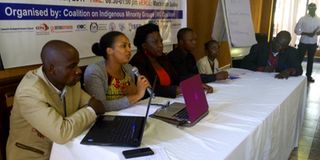Indigenous minorities want fair land policies

Ms Sandra Komuhiimbo (second left) moderating the dialogue. She is flanked by minority group representatives at the dialogue. PHOTO BY ABDUL-NASSER SSEMUGABI
What you need to know:
- The Ik people, estimated around 14000 near Kidepo National Park, in Kaabong, Eastern Uganda, are more worried about hostile neighbours.
- In response, Albert Lokuru MP of the Tepeth, another minority group, said his committee is conducting a research among the Ik, the Tepeth and others to assess their grievances.
KAMPALA. Indigenous minority groups (IMGs) in Uganda have challenged government to show willingness to address their longstanding grievances, key among them: unfair land distribution, lack of political participation and representation, inadequate access to basic health services, and cultural extinction.
Minority groups’ representatives of the Batwa, Benet, Basongora, Banyabindi, Ik, among others, narrated their ordeals during a dialogue with policy makers, organised by the Coalition on Indigenous Minority Groups, at Mackinnon Suites in Kampala, seeking fair treatment and an end to all discrimination against them, over the years.
The Benet, for instance, the original inhabitants of the uppermost parts of Mt Elgon in Eastern Uganda, were displaced as the area was gazetted by government for Mt Elgon National Park. But Isaac Masaba, a coordinator of the Benet Lobby Group, told the conference that since this ethnic minority community of about 20,000 people was put in a temporary resettlement, in 1992, pending permanent resettlement, most of them have been left internally displaced.
“In 1993, government started demarcating between community land and the park so that they could resettle the remaining population. There have been more such demarcations in 2002, 2014 and this year, but all in vain,” Mr Masaba said.
Hence, the Benet cannot produce enough food or access social services like good transport, health facilities. Mr Masaba added that the Uganda Wildlife Authority are hostile, they harass them because they treat them as trespassers on park land. “Government tried but they should show more willingness to resettle our people.”
Like the Benet, since the Batwa (in Western Ugandan districts like Kisoro) were evicted from the Echuya, Bwindi and Mgahinga forests they inhabited until 1991, have suffered. Ms Scora Tumwebaze, of the United Organisation for the Batwa Development in Uganda, said they have no land at all. This has eroded their culture because “our religion depended so much on herbs from the forest, but now when authorities find us collecting those herbs they arrest us and harass us. Dear MPs we need our religion back.”
Government’s delay in resettling these communities does not only contravene Article 21 of the Constitution, which advocates for equal treatment of “all persons” without discrimination, it also contradicts the National Land Policy 2013 which states: “Government shall, in its use and management of natural resources, recognize and protect the right to ancestral lands of ethnic minority groups and …shall pay prompt, adequate and fair compensation to ethnic minority groups that are displaced from their ancestral land by government action.”
The Ik people, estimated around 14000 near Kidepo National Park, in Kaabong, Eastern Uganda, are more worried about hostile neighbours.
“The Karamajong and the Turkana have always tormented us, raided our animals, destroyed our beehives,” said John Mark Lomeri, coordinator of the Ik Agenda Development Initiative. “I want to ask the team brokering the dialogue on disarmament in the region to fast-track it because if the Turkana are not fully disarmed, we are in great danger.” Regarding land, Mr Lomeri said: “the national forestry authority told that we can live there for as long as we want, but that that land can’t be ours, now that’s confusing.”
Because of little access to education, Mr Lomeri also noted, the Ik language has no written dialect, which puts it at a risk of extinction. To echo his concern, Ms Barbara Babweteera of the IMG Coalition, cited that in some minority communities, three languages disappear every three weeks.
Despite the few benefits from oil exploration in n Buliisa district, the Bagungu decry forceful eviction and unfair compensation by oil companies. This, Mr Moses Kiiza said, has hindered agriculture leading to food insecurity in the area.
In response, Albert Lokuru MP of the Tepeth, another minority group, said his committee is conducting a research among the Ik, the Tepeth and others to assess their grievances. He urged marginalised peoples to get organised, “because government is ready to listen.”



